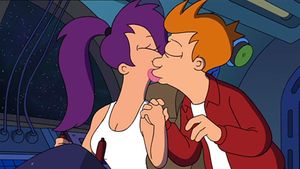Difference between revisions of "Themes"
| Line 2: | Line 2: | ||
{{update}} | {{update}} | ||
''' | '''Running jokes''', '''recurring themes''' and '''[[story arc]]s''' are events, references and actions done by characters on ''[[Futurama]]'', but happens over multiple episodes, which may not have any relation besides these things. | ||
== | == Running jokes == | ||
'''Running jokes''' are similar scenes in unrelated episodes, often the same or similar lines performed by the same or different characters. Examples of this includes [[catchphrase]]s such as ''[[Bite my shiny metal ass]]'', or [[Amy Wong|Amy]] at any time possible teasing Leela about her general appearance. | |||
== | == Recurring themes == | ||
'''Recurring themes''' differ from running jokes in that they are not necessary jokes or meant for comic relief. This includes the many relationships and character conflicts in the Futurama universe that stay basically the same from episode to episode, without evolvment, for example the [[Farnsworth-Wernstrom conflict]]. Another recurring theme is a relatively rare element used in several episodes, such as [[time travel]]. These episodes often include references to eachother, but tell otherwise unrelated stories. | |||
[[File:Into the Wild Green Yonder awe.jpg|right|thumb|The [[Fry-Leela relationship]] is one of Futurama's bigger '''story arcs'''.]] | |||
== Story arcs == | |||
{{main|Story arc}} | |||
The difference between recurring themes and '''[[story arc]]s''' (or overall plotlines) is that a story arc advances with the series, and it lay in the background in multiple episodes as well as showing more clearly in others. A good example of this is the [[Fry-Leela relationship]], which starts early in the series and advances from a light crush on Fry's part into deep love to the degree that he risks his life saving her in "[[Rebirth]]", as well as including Leela's feelings in "[[Into the Wild Green Yonder]]" and episodes such as "[[The Late Philip J. Fry]]". A story arc can also show up in only a few episodes and not be mentioned in others, such as the [[Nibblonian arc]] or [[Fry's origin]]. The main difference between story arcs and recurring themes is basically that a story arc only work if the series is viewed in order, while recurring themes basically reset to the [[status quo]] in the end of each episode - [[Mom]] and [[Professor Hubert J. Farnsworth|the Professor]] still hate eachother in the end of "[[Mother's Day]]", but [[Philip J. Fry|Fry]] and [[Turanga Leela|Leela's]] kiss in the end of "[[Into the Wild Green Yonder]]" can not easily be ignored. | |||
{{stub}} | {{stub}} | ||
Revision as of 13:21, 11 August 2010
Running jokes, recurring themes and story arcs are events, references and actions done by characters on Futurama, but happens over multiple episodes, which may not have any relation besides these things.
Running jokes
Running jokes are similar scenes in unrelated episodes, often the same or similar lines performed by the same or different characters. Examples of this includes catchphrases such as Bite my shiny metal ass, or Amy at any time possible teasing Leela about her general appearance.
Recurring themes
Recurring themes differ from running jokes in that they are not necessary jokes or meant for comic relief. This includes the many relationships and character conflicts in the Futurama universe that stay basically the same from episode to episode, without evolvment, for example the Farnsworth-Wernstrom conflict. Another recurring theme is a relatively rare element used in several episodes, such as time travel. These episodes often include references to eachother, but tell otherwise unrelated stories.

Story arcs
- Main article: Story arc
The difference between recurring themes and story arcs (or overall plotlines) is that a story arc advances with the series, and it lay in the background in multiple episodes as well as showing more clearly in others. A good example of this is the Fry-Leela relationship, which starts early in the series and advances from a light crush on Fry's part into deep love to the degree that he risks his life saving her in "Rebirth", as well as including Leela's feelings in "Into the Wild Green Yonder" and episodes such as "The Late Philip J. Fry". A story arc can also show up in only a few episodes and not be mentioned in others, such as the Nibblonian arc or Fry's origin. The main difference between story arcs and recurring themes is basically that a story arc only work if the series is viewed in order, while recurring themes basically reset to the status quo in the end of each episode - Mom and the Professor still hate eachother in the end of "Mother's Day", but Fry and Leela's kiss in the end of "Into the Wild Green Yonder" can not easily be ignored.